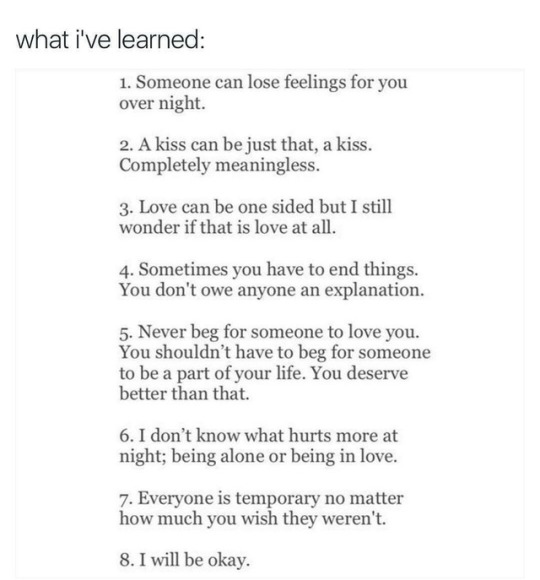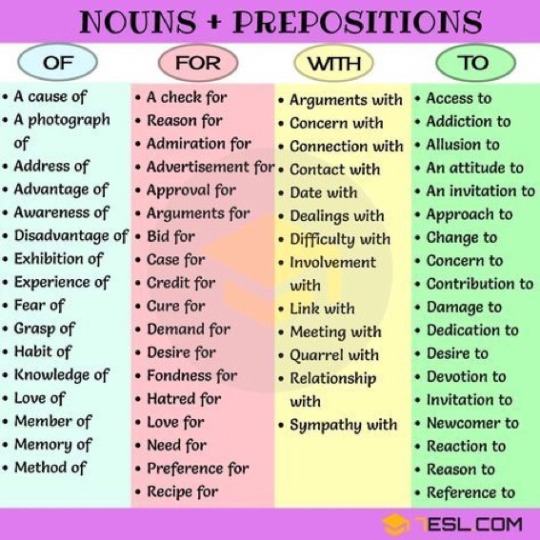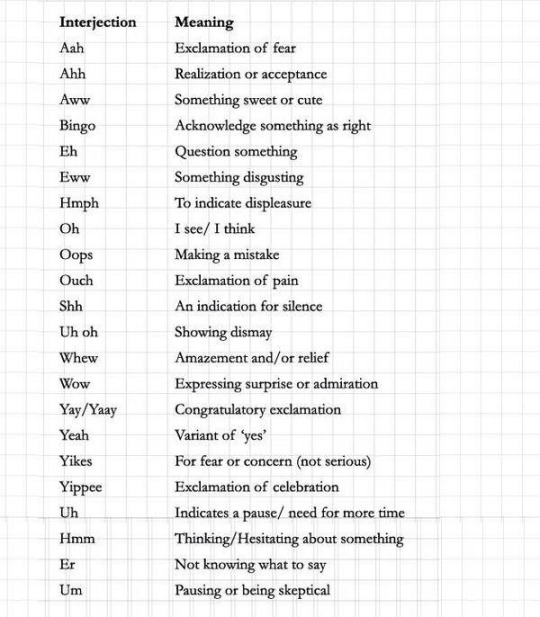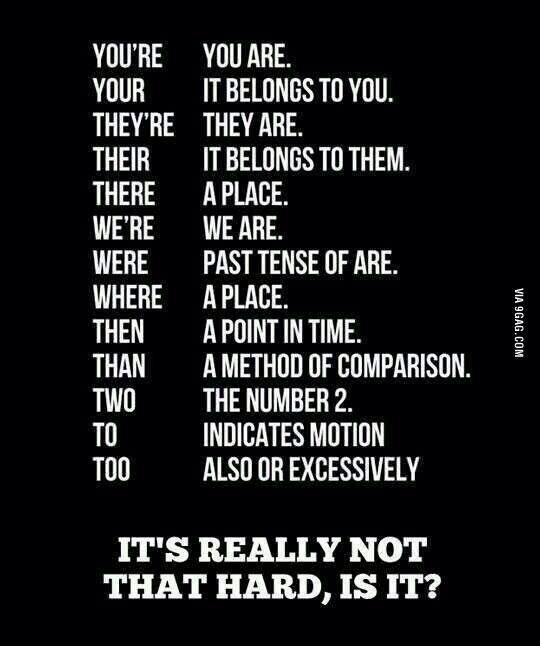Don't wanna be here? Send us removal request.
Text
Note to self!
“If there was another girl, there will always be another girl. Even if he stops talking to that girl, there's always a chance of them talking to each other again. Even if they do completely stop talking, there's always a chance of there being a different girl coming in to the picture. If he left you for another girl once and you take him back, there's always a chance of him leaving you for another girl again. You'll never be the only girl for him because you were never enough for him, and that's something you need to look past your heart and realize. He will never change because he doesn't want to change, and that's something you need to look past your feelings and accept. He will always be someone who will lie to you because he doesn't care enough about you to be honest, and that's something you need to look past your emotions and understand. He's already proven that he can be easily distracted, he's already shown that he can be easily manipulated, and he's already demonstrated that he can be easily tempted. As much as you'd want him to be, he's not the right guy for you. Stop forgiving what shouldn't be forgiven, stop believing that he deserves you, and stop trying to force something to work that's not meant to. Please don't go back to him, because you can't find happiness where you've lost it.”
0 notes
Text
Why incompetent people think they’re amazing
Are you as good at things as you think you are? How good are you at managing money? What about reading people’s emotions? How healthy are you compared to other people you know? Are you better than average at grammar?

Knowing how competent we are and how are skill stack up against other people’s is more than a self-esteem boost. It helps us figure out when we can forge ahead on our own decisions and instincts and when we need, instead, to seek out advice. But psychological research suggests that we’re not very good at evaluating ourselves accurately. In fact, we frequently overestimate our own abilities. Researchers have a name for this phenomena: the Dunning-Kruger effect. This effect explains why more than 100 studies have shown that people display illusory superiority.

We judge ourselves as better than others to a degree that violates the laws of math. When software engineers at two companies were asked to rate their performance, 32% of the engineers at one company and 42% at the other put themselves in the top 5%.

In another study, 88% of American drivers described themselves as having above average driving skills. These aren’t isolated findings. On average, people tend to rate themselves better than most in disciplines ranging from health, leadership skills, ethics, and beyond. What’s particularly interesting is that those with the least ability are often the most likely to overrate their skills to the greatest extent. People measurably poor at logical reasoning, grammar, financial knowledge, math, emotional intelligence, running medical lab tests, and chess all tend to rate their expertise almost as favorably as actual experts do.

So who’s most vulnerable to this delusion? Sadly, all of us because we all have pockets of incompetence we don’t recognize. But why? When psychologists Dunning and Kruger first described the effect in 1999, they argued that people lacking knowledge and skill in particular areas suffer a double curse. First, they make mistakes and reach poor decisions. But second, those same knowledge gaps also prevent them from catching their errors. In other words, poor performers lack the very expertise needed to recognize how badly they’re doing. But, the Dunning-Kruger effect isn’t a question of ego blinding us to our weaknesses. People usually do admit their deficits once they can spot them.

In one study, students who had initially done badly on a logic quiz and then took a mini course on logic were quite willing to label their original performances as awful. That may be why people with a moderate amount of experience or expertise often have less confidence in their abilities. They know enough to know that there’s a lot they don’t know. Meanwhile, experts tend to be aware of just how knowledgeable they are. But they often make a different mistake: they assume that everyone else is knowledgeable, too. The result is that people, whether they’re inept or highly skilled, are often caught in a bubble of inaccurate self-perception. When they’re unskilled, they can’t see their own faults. When they’re exceptionally competent, they don’t perceive how unusual their abilities are.
So if the Dunning-Kruger effect is invisible to those experiencing it, what can you do to find out how good you actually are at various things? First, ask for feedback from other people, and consider it, even if it’s hard to hear. Second, and more important, keep learning. The more knowledgeable we become, the less likely we are to have invisible holes in our competence. Perhaps it all boils down to that old proverb: When arguing with a fool, first make sure the other person isn’t doing the same thing.
From the TED-Ed lesson Why incompetent people think they’re amazing - David Dunning
Animation by Wednesday Studio
1K notes
·
View notes
Photo

In British English, there are some verbs which take both an -ed ending or -t ending in the past simple and past participle forms. In American English, only the -ed spelling is used. Please see the visual.
(Source: “English Grammar in Use” by Raymond Murphy)
33 notes
·
View notes
Text
Why do we love?

Ah, romantic love; beautiful and intoxicating, heart-breaking and soul-crushing… often all at the same time! Why do we choose to put ourselves though its emotional wringer? Does love make our lives meaningful, or is it an escape from our loneliness and suffering? Is love a disguise for our sexual desire, or a trick of biology to make us procreate? Is it all we need? Do we need it at all?
If romantic love has a purpose, neither science nor psychology has discovered it yet – but over the course of history, some of our most respected philosophers have put forward some intriguing theories.
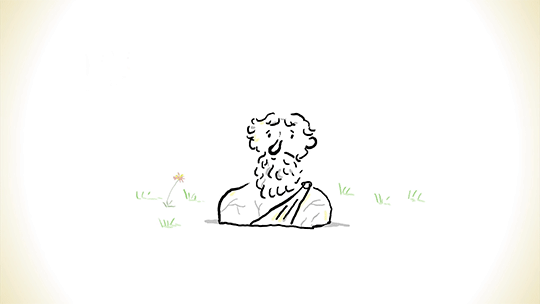
1. Love makes us whole, again / Plato (427—347 BCE)
The ancient Greek philosopher Plato explored the idea that we love in order to become complete. In his Symposium, he wrote about a dinner party at which Aristophanes, a comic playwright, regales the guests with the following story. Humans were once creatures with four arms, four legs, and two faces. One day they angered the gods, and Zeus sliced them all in two. Since then, every person has been missing half of him or herself. Love is the longing to find a soul mate who will make us feel whole again… or at least that’s what Plato believed a drunken comedian would say at a party.
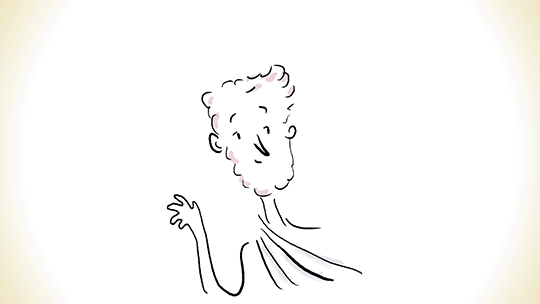
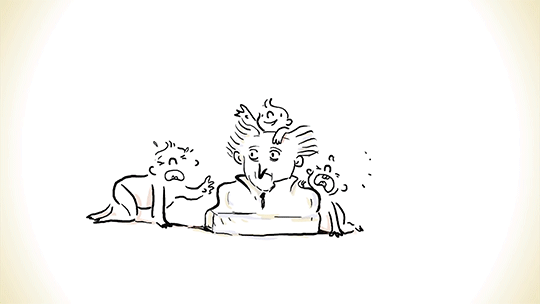
2. Love tricks us into having babies / Schopenhauer (1788-1860)
Much, much later, German philosopher Arthur Schopenhauer maintained that love, based in sexual desire, was a “voluptuous illusion”. He suggested that we love because our desires lead us to believe that another person will make us happy, but we are sorely mistaken. Nature is tricking us into procreating and the loving fusion we seek is consummated in our children. When our sexual desires are satisfied, we are thrown back into our tormented existences, and we succeed only in maintaining the species and perpetuating the cycle of human drudgery. Sounds like somebody needs a hug.


3. Love is escape from our loneliness / Russell (1872-1970)
According to the Nobel Prize-winning British philosopher Bertrand Russell we love in order to quench our physical and psychological desires. Humans are designed to procreate; but, without the ecstasy of passionate love, sex is unsatisfying. Our fear of the cold, cruel world tempts us to build hard shells to protect and isolate ourselves. Love’s delight, intimacy, and warmth helps us overcome our fear of the world, escape our lonely shells, and engage more abundantly in life. Love enriches our whole being, making it the best thing in life.


4. Love is a misleading affliction / Buddha (~6th- 4thC BCE)
Siddhartha Gautama. who became known as ‘the Buddha’, or ‘the enlightened one’, probably would have had some interesting arguments with Russell. Buddha proposed that we love because we are trying to satisfy our base desires. Yet, our passionate cravings are defects, and attachments – even romantic love – are a great source of suffering. Luckily, Buddha discovered the eight-fold path, a sort of program for extinguishing the fires of desire so that we can reach ‘nirvana’ – an enlightened state of peace, clarity, wisdom, and compassion.
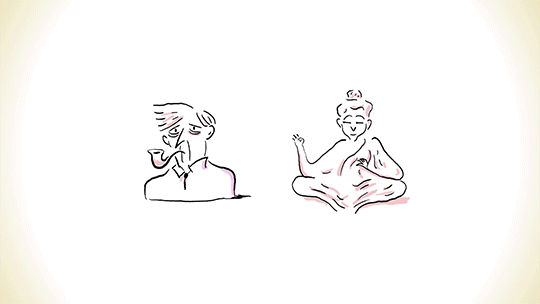

5. Love lets us reach beyond ourselves / Beauvoir (1908-86)
Let’s end on a slightly more positive note. The French philosopher Simone de Beauvoir proposed that love is the desire to integrate with another and that it infuses our lives with meaning. However, she was less concerned with why we love and more interested in how we can love better. She saw that the problem with traditional romantic love is it can be so captivating that we are tempted to make it our only reason for being. Yet, dependence on another to justify our existence easily leads to boredom and power games.

To avoid this trap, Beauvoir advised loving authentically, which is more like a great friendship: lovers support each other in discovering themselves, reaching beyond themselves, and enriching their lives and the world, together.
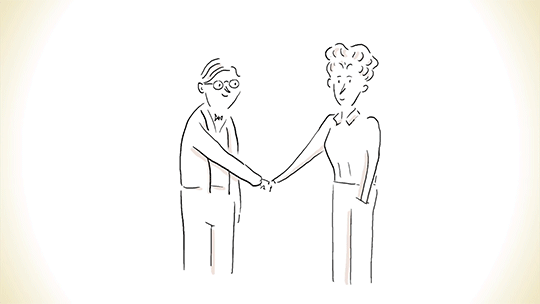
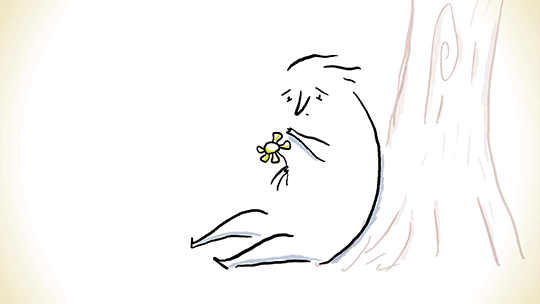
Though we might never know why we fall in love, we can be certain that it’ll be an emotional rollercoaster ride. It’s scary and exhilarating. It makes us suffer and makes us soar. Maybe we lose ourselves. Maybe we find ourselves. It might be heartbreaking or it might just be the best thing in life. Will you dare to find out?
From the TED-Ed Lesson Why do we love? A philosophical inquiry - Skye C. Cleary
Animation by Avi Ofer
3K notes
·
View notes
Text
Love Story
Sometimes in your life, you will meet the person that will make you happy, make you feel in love, give you hope, give you strength, and keep you dreaming about your future with him. Seems like, God already answered your prayer. And they say, if a guy includes you with his future plan, he is serious to you.
Accepting flaws, hug each other, fulfilling your dreams together, building your own family, never give up to each other fast, and fix your issue together before end of the day. Oh, it so nice to think this future plan right?
As time goes by, everything has changed. One is still keep dreaming and waiting for his formal proposal, and on the other hand, one found someone new. One who is still keep dreaming feel bad about what happened but of course she understands that their situation is not easy as they are living far to each other. You cannot blame her to feel sad and have teary eyes every time she’s seeing a baby pictures, every time she remember their future plan, and every time she feels that she’s no longer exist on his life and someone else will fulfill their future plan together. She even asked God why it happened? What’s wrong with her? But then, she realized that maybe God did this to stay away to someone who is not meant for her.
0 notes
Text
Pronuncation as a means to Effective Communication

Are you interested in improving your pronunciation?
For Spanish people in general, improving their pronunciation is a common goal.
There are particular difficulties between the two languages; English speakers equally have as many difficulties with Spanish pronunciation and accent as Spanish speakers do with English. However, due to the phonetic way of reading and pronouncing Spanish words, Spanish tends to be easier than English with its groups of strangely pronounced sounds – take the horrible combination of ‘ough’ which is pronounced umpteen different ways depending on the word!
For Spanish speakers in Spain there is a strong sense of importance and emphasis on the correct pronunciation and accent in Spanish, which is carried over into their desire to speak English equally correctly. For English speakers, however, this is less important; knowing and accepting that there are many correct accents and ways of pronouncing words; I was told recently that in London alone there are five distinct accents, let alone in the rest of the UK, the United States, Australia, New Zealand, South Africa and even India where English is the national language. All are accept as correct.
Many non-native speakers, not just Spanish speakers, look for accent modification/accent reduction training as a way to learn strategies that will help them to improve their pronunciation. The ideal way, obviously, would be with a specialised trainer but there are also many self-help training programs available. Nevertheless, unfortunately this does not provide you with feedback on how they are doing is an essential way of learning what your mistakes are and what to do to improve them so doing this alone is really not the best way to go about improving. There are many software programs out there, but you have to be careful that they have the ability to identify subtle stress and intonation patterns which are essential features to address in accent modification. I have had my own personal problems with software programs. Taking a course on teaching English via an online program, we were expected to understand the program both from the teachers’ side and as well as the students’ so as to understand any potential problems they might be facing whilst using the program. This entailed doing the pronunciation exercises online; I failed all of them and I have to say that my British accent is pretty good! It’s not just English language programs. While I was trying to learn French recently, the software stated that I was incapable of pronouncing anything correctly which was very disheartened. When my French teacher also had an equally bad score, I realised that it was not necessarily my bad accent but rather the software program. Though, that does not excuse my French accent, it still is pretty bad!
Here are some ways to either get started, supplement the training you might currently be taking, or brush up on your skills: 1. Find a speech role model Find someone who speaks in a way you like, that you can identify with and is pleasant to your ear. It does not matter who this is, it could be a radio or TV personality, a family member, friend or colleague. Do you like the tone, rate of speech, resonant quality or way of phrasing? Try to imitate those features you consider to be desirable in your own communication. 2. Get a professional’s opinion It is difficult to change aspects of your speech if you don’t know what problems are affecting the effectiveness of your communication. It could be a good idea to find a specialist who can help you identify areas that may need improvement, if you really consider that you have problems. 3. Video or audio-record yourself Despite the fact that many people are intimidated by this, it is actually very helpful to hear and see how you may present yourself to others. It really does not matter how low or high-tech it is. Consider how you look - fidgeting, playing with your hair (my particular tendency), wringing your hands, moving about nervously), how you sound (monotone, too fast, nasal, too quiet), and how you speak (using professional language or too much slang, rambling, long-winded or concise)? 4. Ask for feedback from those you trust If you feel as though your communication may be holding you back at work, ask your manager, colleagues, and others for honest feedback. People who interact with you frequently and in a variety of settings such as on the phone, in meetings, during formal presentations, and so on are best. 5. Project your voice Take deep abdominal breaths and speak as you exhale; do not waste any air. Keep your mouth open and relaxed. Look in the direction you want your voice to go and imagine your breath stream floating along the air towards your target (this would be a person or an object far away from you). Take replenishing breaths as needed so the end of your sentence sounds as loud and strong as the beginning. It is best to stand up when speaking. 6. Pronounce your sounds clearly It is always a good idea to make sure that your word sounds are accurate and clear, especially at the ends of words. Always finish the words properly so that you say “thinking” instead of “thinkin’,” and “biggest,” not “bigges-.”One of my personal annoyances is when people learn contracted expressions such as ‘gonna’, ‘wanna’ or ‘dunna’ when they are young at school as a way of learning authentic speech. I personally feel that authentic speech will come naturally when people are familiar and comfortable about speaking in another language, but it is essential for clear, easily understood speech if you know what the correct ‘un’contracted version is so that you can use it correctly in appropriate situations. 7. Speak at a slightly slower rate When people are nervous, they tend to speak too fast. Some people think that speaking fast is a sign that they can speak the language well. However, slightly reducing your speaking rate by stretching out the vowels and pausing where a comma or full-stop would occur infinitely increases your ability to communicate clearly an well. Chunk information into manageable groupings, and then take a breath before continuing. Try to speak at the same rate as the person with whom you are speaking (assuming they are not racing themselves!) This is a way of inducing rapport, empathy and a sense of connection which enables people to listen and understand better. 8. Use appropriate intonation Try to speak with a natural, varied inflection pattern. Stress the last important word in a thought group. This will make it stand out and be remembered. Stress the word by slightly raising your pitch, speaking slightly louder, and lengthening your vowels. If you just use a louder voice, you may sound angry. Smile to infuse a little more energy and/or personality in your voice. 9. Practice idiosyncratic stress rules when reading Everywhere you look, you will see proper nouns (business cards); compound nouns (grocery store circulars); numbers (appointment books), and other written references to pronunciation rules. Use every opportunity to read aloud practicing your newly learned techniques for proper stress and intonation. 10. Practice whenever, wherever, and with whomever you can Use every speaking situation as an opportunity to practice your best speech techniques. Practise makes perfect! Listen and observe the reactions/responses to your speech from all you encounter.
And most importantly, enjoy it in the best way you can and do not worry about how long it takes, all effort is good effort and it will eventually come.
At One Stop Language we can help you with improving your pronunciation as well as developing effective communication techniques.www.onestop-language.comwww.onestop-language.com
44 notes
·
View notes
Text
@englishneverstops
When you’re tired...
Are you tired of just saying “I’m tired” every time you’re tired? Well, there are some options you have beside this phrase—and interestingly, they all convey different degrees of tiredness. I’ll give you some that I often use myself.
“I’m beat.”
This is a good phrase for when you are really tired from any kind of activity. It’s pretty strong, too. In regular words, it’s like “really-really tired.”
“I’m exhausted.”
This is very strong, probably “really-really-really tired.” If you say this, basically you can’t do anything at this point—your body is too tired.
“I’m so out of it.”
This one is a bit indirect. It means that you cannot focus or concentrate on something, most likely because you are very tired.
“I’m done.”
You can say this in various ways: “I’m done [for the day/the night/the week]. If you say it with a sigh, it implies your tiredness. You can also say “I’m so done” for greater emphasis.
“I’ve had enough [of this/that].”
This doesn’t literally mean that you are tired; instead, it means that you don’t want to do something anymore. You are tired of/fed up with something that you no longer enjoy.
Of course, you can always say that you’re sleepy or want to rest. Plus, there are many more different phrases that vary by region/country. But at least this list provides some options to English learners besides just saying “I’m tired.”
If you are an English-speaker and have any other phrases that you often use, please share them in the comments!
80 notes
·
View notes
Text
THE TIME RULE from my English teacher friend
Every second IS a new PRESENT 1 second ago WAS the PAST 1 second ahead WILL BE the FUTURE EXAMPLE: 1. In 1 second, i will touch the ball. 2. 1 second ago, i touched the table once. 3. Now, i have touched the table once. 4. I haven't touched the table 3 times. I Hope this will help you to improve your english skills. Ciao!
4 notes
·
View notes
Text
we work for money even though we're not happy anymore because we have to live, we have to help our family by providing money and for us not to be burden.
4 notes
·
View notes
Quote
If you Listening,you will Speaking. If you Reading, you will Writing
ALL ENGLISH ALL THE TIME. (via nadersamir10)
Great post Nader! Consistently practicing these skills is essential to everyone’s improvement within our community!
One quick thing to work on with your writing, remember to re-read your post and to check that your verb tenses are correct.
"If you (VT)listening, you will (VT)speaking. If your (VT)reading, you will (VT)writing."
If you ARE listening, you will BE speaking. If you ARE reading you will BE writing.”
Keep on writing!
(via englishneverstops)
If you will be a good listener, you will be a good speaker. If you will be a good reader, you will be a good writer.
9 notes
·
View notes

